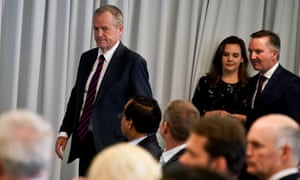Scott Morrison and his offsiders are competing for the title of biggest numpty as Labor offers sensible solutions
On climate and energy policy, Labor never learns from its mistakes, Scott Morrison told us on Thursday, apparently limbering up for another heart-warming election season of who can be the biggest numpty.
The prime minister is wrong about that. The evidence tells us Labor does learn from its mistakes, and in climate and energy the ALP have become shape shifters in order to keep doggedly pursuing policies reducing emissions in an environment when that activity is construed, ever more bizarrely in reactionary circles, as some kind of hostile action.
Again, with our eyes fixed firmly on the evidence, we can note Morrison is brave to be talking about mistakes and a lack of learning in climate and energy policy, given the Coalition has been a rolling botch-up in this area, lurching from bouts of hyperpartisan self-interest to desperate scrambling to produce a policy that Tony Abbott wouldn’t veto (oops he vetoed it anyway), ending at a point that can only be described as outright clustercuss.Just consider one small counterpoint from Thursday. Bill Shorten went to Bloomberg and laid out an energy policy that defined the pressing challenge of transforming Australia’s energy market from top to bottom, and then he rolled out some detailed policy options for dealing with it.
The prime minister is wrong about that. The evidence tells us Labor does learn from its mistakes, and in climate and energy the ALP have become shape shifters in order to keep doggedly pursuing policies reducing emissions in an environment when that activity is construed, ever more bizarrely in reactionary circles, as some kind of hostile action.
Again, with our eyes fixed firmly on the evidence, we can note Morrison is brave to be talking about mistakes and a lack of learning in climate and energy policy, given the Coalition has been a rolling botch-up in this area, lurching from bouts of hyperpartisan self-interest to desperate scrambling to produce a policy that Tony Abbott wouldn’t veto (oops he vetoed it anyway), ending at a point that can only be described as outright clustercuss.Just consider one small counterpoint from Thursday. Bill Shorten went to Bloomberg and laid out an energy policy that defined the pressing challenge of transforming Australia’s energy market from top to bottom, and then he rolled out some detailed policy options for dealing with it.
The energy minister, Angus Taylor, by way of riposte, bunged on a high-vis vest, stood in front of a smelter in Tomago, and talked about Shorten having to nominate which burping cows he would cull, which, for a person of Taylor’s intelligence and technical expertise, must feel about as close as it comes to End Times.
We’ve been here before: the hyperbolic carry on, it’s all pretty tired.
It was stupid then and it’s even more stupid now, with the clock ticking, the grid creaking, power prices rising and emissions rising in sectors of the economy outside electricity. We don’t have time for more nonsense, and there’s already been far too much of it.
When it comes to climate and energy policy, voters desperately need someone to be a grown-up and, on Thursday, Shorten told them, in his most important speech as opposition leader, that it would be him.
He would be the grown-up because, God knows, someone had to be.
Now, to the merits of Shorten’s policy offering. It’s a bit depressing, frankly, where we find ourselves, at the tail end of the dumbest decade, because the only options to achieve progress are third-order options, where governments are back to rolling out industry policies as the solution to problems.
A number of business groups on Thursday pointed out the downside risks of energy policy by picking winners but frankly some of those business groups were also on the front line of campaigning against a carbon price, a market mechanism, only a couple of years ago – so, chaps, what goes around comes around. You reap what you sow.
So, we are where we are. Wishing it were otherwise is a waste of energy and a waste of time and, in the context of where we are, Labor’s offering is sensible enough.
The plan looks like this. Give the Liberals one more chance not to be wreckers on the taxpayer dime, give them an opportunity to wake up for themselves and vote for their own mechanism, the national energy guarantee. And in the event that fails, then drive the required transformation by a combination of measures: a 45% economy-wide emissions reduction target, funding the Clean Energy Finance Corporation to drive new investments in large-scale generation and storage, upgrading sub-optimal transmission infrastructure and preparing coal communities for the inevitable transition.
Conceptually, that’s not a bad mud map.
Of course there will be detailed questions to answer, and there’s an obvious one sitting right at the heart of Labor’s package.
If the economy-wide emissions reduction target is 45% (and that’s the plan) then shouldn’t the emissions reduction target for the electricity sector be higher than that given abatement is cheaper in electricity than in other sectors of the economy? It’s cheaper to reduce emissions in electricity than it is, say, in transport.
The reality is the electricity target should be higher than 45% to try and contain the costs of the transition.
It’s a question that needs an answer but that’s a tangle Labor won’t want to get into, particularly given Taylor and others are already thundering apocalyptically about “wrecking balls” through the economy.

No comments:
Post a Comment